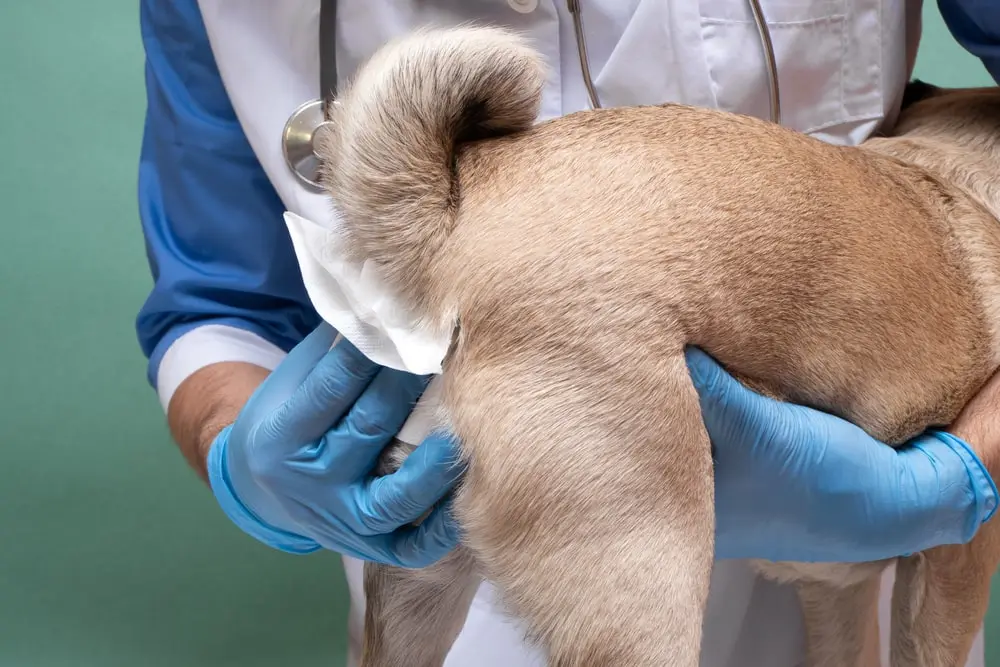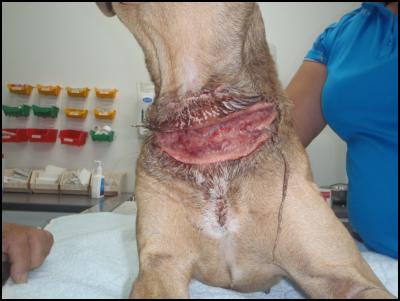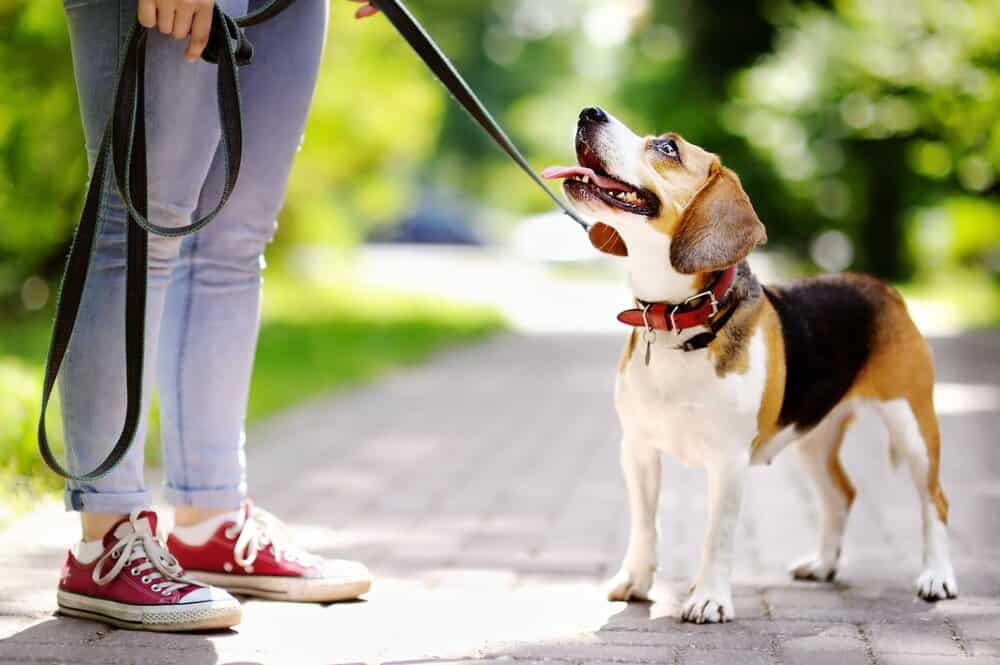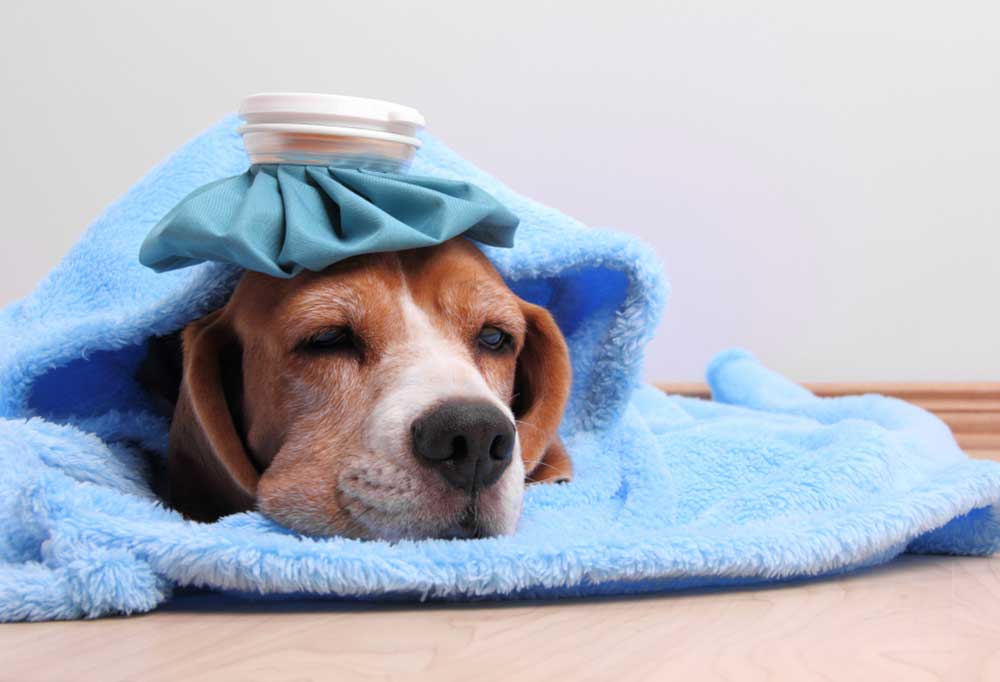How to help dog express glands naturally anal gland issues can be a common concern for many dog owners, and it’s understandable why. These tiny glands can cause discomfort and pain for our furry friends if not properly maintained. But fear not, there are simple and holistic approaches to support your dog’s anal gland health.
First, let’s understand what these glands do. Anal glands, also known as anal sacs, are small glands located on either side of your dog’s anus. They secrete a fluid with a distinct odor that dogs use for scent marking and communication with other dogs. Under normal circumstances, these glands empty naturally during bowel movements.
However, sometimes these glands can become impacted or infected, leading to issues like anal gland impaction, abscesses, or inflammation. Symptoms of anal gland problems can include scooting, licking or biting at the rear end, foul odor, and discomfort during defecation.
To help keep your dog’s anal glands healthy, there are a few things you can do holistically:
- Dietary Fiber: Ensure your dog’s diet contains adequate fiber, which can help regulate bowel movements and promote natural emptying of the anal glands. Consider adding fiber-rich foods like pumpkin, sweet potato, or green beans to their diet.
- Regular Exercise: Regular physical activity can help promote regular bowel movements, which can aid in the natural expression of the anal glands.
- Proper Hydration: Make sure your dog drinks plenty of water, as adequate hydration is essential for healthy bowel function.
- Anal Gland Expression: If your dog is prone to anal gland issues, consider regular, gentle expression of the glands by a qualified professional, such as a groomer or veterinarian.
- Holistic Supplements: Certain supplements, such as omega-3 fatty acids or probiotics, may help support overall digestive health and reduce inflammation in the anal glands.
By incorporating these holistic approaches into your dog’s routine, you can help support their anal gland health and reduce the likelihood of discomfort or issues in the future. As always, if you notice any signs of anal gland problems, it’s essential to consult with your veterinarian for proper diagnosis and treatment how to help dog express glands naturally.
What are the Anal Glands?
The anal glands, while often overlooked, play a crucial role in your dog’s communication and territorial behavior. These small sacs, located beside the anus, produce a fluid with a distinct odor unique to each dog. Normally, these glands empty during bowel movements, thanks to a little sphincter mechanism that opens and closes when your dog defecates.
In the wild, anal glands serve as a means for animals like wolves to mark their territory and communicate with others. Similarly, dogs use their anal gland secretions as a form of communication, conveying information about their sex, health status, approximate age, and whether they’ve met before. This scent-based communication is why dogs are often seen sniffing each other’s rear ends—it’s like reading the headlines of a newspaper for them.
While anal glands may seem like a trivial anatomical feature, they’re actually vital for your dog’s social interactions and understanding of the world around them. So, while you may cringe at the thought of your dog’s butt-sniffing behavior, remember that it’s just their way of gathering important information from their surroundings how to help dog express glands naturally.
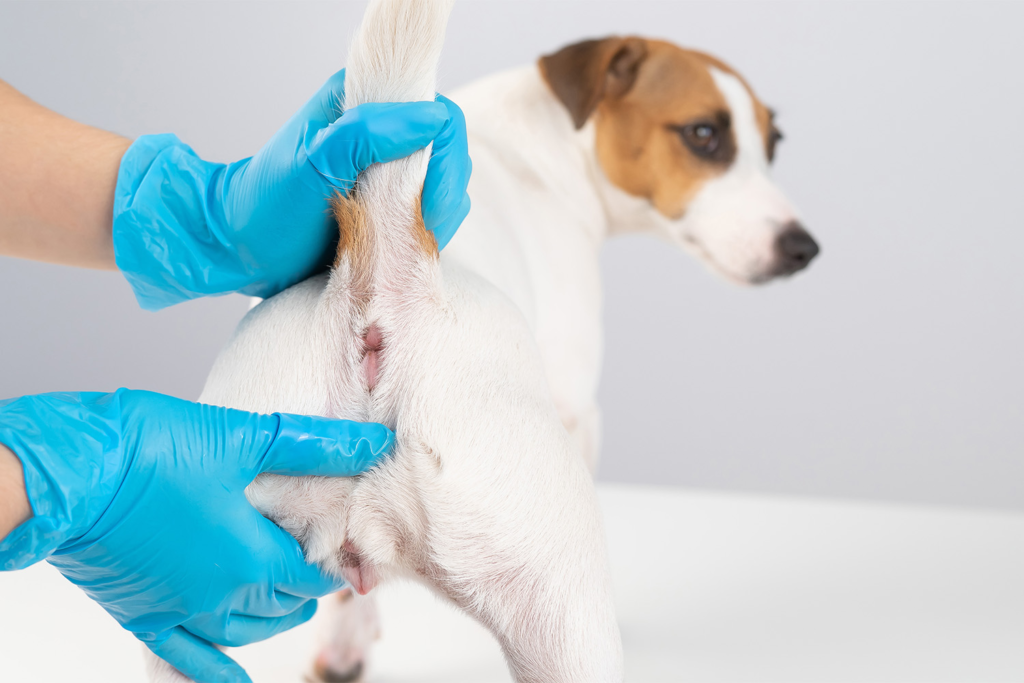
Common Anal Gland Issues
anal glands are a common issue in dogs and cats, occurring when the fluid within the glands builds up and cannot be naturally expressed. The root cause of this problem often lies in the consistency of your pet’s stool. Contrary to what many believe, stools should not be perfectly uniform—they should contain bumps and lumps that help massage the anal glands during bowel movements, facilitating expression.
Pets on processed diets tend to have softer stools that lack the necessary texture to effectively massage the anal glands. Additionally, insufficient exercise and diets lacking in fiber or digestive enzymes can contribute to impaction. Therefore, maintaining solid, lumpy stools is key to preventing anal gland issues.
Inflammation of the anal glands can also occur, often stemming from food allergies or sensitivities. Excessive licking or scooting due to irritation can lead to gland swelling, causing the sphincter to tighten and impair fluid excretion, resulting in thickened secretions and impaction. Moreover, once impacted, the glands can become infected, exacerbating the problem.
Furthermore, repeated manual expression of the anal glands by groomers or veterinarians can lead to scarring. Similar to squeezing a pimple, excessive manipulation can cause inflammation and scar tissue buildup, hindering natural gland function and perpetuating a cycle of veterinary treatments.
Although less common, anal gland adenocarcinoma or tumors can also occur, particularly in cases of chronic anal gland issues. Therefore, it’s essential to monitor your pet’s anal gland health and consult your veterinarian if you notice any persistent issues or abnormalities how to help dog express glands naturally.
Supporting Anal Gland Health Holistically
Maintaining awareness of your dog’s stool consistency is essential for monitoring their anal gland health. If their stools are too soft, it’s advisable to adjust their diet to promote firmer stools, reducing the likelihood of anal gland issues.
Increasing the amount of bone in your pet’s diet, particularly in a raw food diet with ground bone, can be beneficial. Adding extra bone, such as chicken necks, turkey necks, or duck necks, is recommended, as these bones facilitate the formation of calcified pieces in the stool. However, it’s crucial to avoid excessive bone consumption, which can lead to overly hard stools and discomfort.
For pets allergic to poultry, oxtail is a suitable alternative, providing a softer texture that aids digestion. Additionally, incorporating fiber-rich foods like leafy greens, squash, and pumpkin can help achieve the desired stool consistency.
Sometimes, digestive issues may contribute to anal gland problems. In such cases, introducing digestive enzymes or specific probiotics may be beneficial, with digestive enzymes being a preferred option. Small breeds, in particular, may be more susceptible to anal gland issues, requiring extra attention to their diet and stool consistency.
When offering bones to small breed dogs, supervision is essential to prevent choking hazards. Holding the bone while they chew can ensure they receive the benefits of bone consumption while minimizing the risk of choking. Additionally, this method can help clean their teeth and promote dental health.
Natural Remedies for Anal Gland Issues
Starting with bone in your dog’s diet can be a proactive approach to addressing anal gland issues. Keep a close eye on their stool consistency and monitor any changes in licking or scooting behavior, as these may indicate improvement.
In addition to dietary adjustments, several homeopathic remedies can help alleviate inflammation and pain associated with anal gland problems. A combination of Aconite and Arnica, such as our Go-2 formula, can be effective in reducing discomfort and encouraging normal bowel movements.
Silica is another beneficial remedy that supports the body in expelling foreign substances, aiding in the natural process of anal gland expression.
If anal gland impaction is accompanied by infection and pain, Hepar Sulph can be added to the treatment regimen to address these symptoms. However, if pain is not a concern, focusing on the other remedies may suffice.
Administer Arnica 200C and Aconite 200C three times a day for one day, followed by Silica 12C or 30C three times a day for up to 10 days. If necessary, include Hepar Sulph 30C three times a day for the initial 3-5 days to address infection and pain.
Additionally, applying a compress with green and chamomile tea or epsom salt to the anal glands can help soothe inflammation. Allow your dog to choose between warm or cold compresses, as preferences may vary. CBD oil can also be applied directly to the glands to reduce pain and inflammation.
If your dog’s anal glands are extremely painful or infected, it’s important to seek veterinary care promptly. Once the issue has been addressed, continue to support your dog’s health with proper diet and supplements, such as bone and digestive enzymes.
Should You Remove the Anal Glands?
While some veterinarians may recommend surgical removal of a dog’s anal glands for chronic issues, I hold a different perspective on this matter. I am not in favor of manual expression of anal glands, nor do I support the removal of these glands altogether.
Every component of the body, whether in a dog, cat, or any other animal, serves a purpose. The anal glands play a crucial role in how your dog perceives the world and communicates with other animals. Simply removing them due to inconvenience is not aligned with my philosophy of holistic pet care.
Although there may be concerns about the development of tumors from chronic inflammation and manual expression of the anal glands, I believe there are alternative approaches to address these issues without resorting to removal. Throughout my 20 years of practice, I have successfully helped numerous patients recover from recurring anal gland problems without the need for surgical intervention.
I am committed to exploring all possible avenues to support your pet’s communication and overall health while preserving the integrity of their glands and preventing anal gland issues from occurring. With proper care and attention, we can ensure your animal’s well-being without resorting to drastic measures like gland removal.
Always Contact Your Veterinarian
Before embarking on any home treatment for your dog’s health issues, it’s essential to seek guidance from your veterinarian. They possess comprehensive knowledge of your pup’s medical history and condition, making them the most qualified to diagnose any problems accurately. Consulting with your vet ensures that they can confirm whether your dog indeed has an anal gland issue and provide appropriate guidance on the best course of treatment. This step is crucial for your dog’s well-being and safety, as it helps prevent any potential complications or exacerbation of existing problems.
What Causes Anal Gland Swelling?
Anal gland swelling can occur due to a range of reasons, spanning from mild to severe. These issues are often easily treatable, especially when addressed promptly. Common causes include dietary factors, lack of exercise, and other lifestyle habits. Making adjustments to your dog’s diet and exercise routine can often help correct these issues how to help dog express glands naturally.
Encouraging your dog to engage in physical activity and exercise can be beneficial. Whether it’s playing games, exploring new places, or trying out activities that excite them, finding what sparks joy in your dog can help keep them active and healthy. By incorporating regular exercise into their routine, you can promote better overall well-being and potentially alleviate anal gland issues.
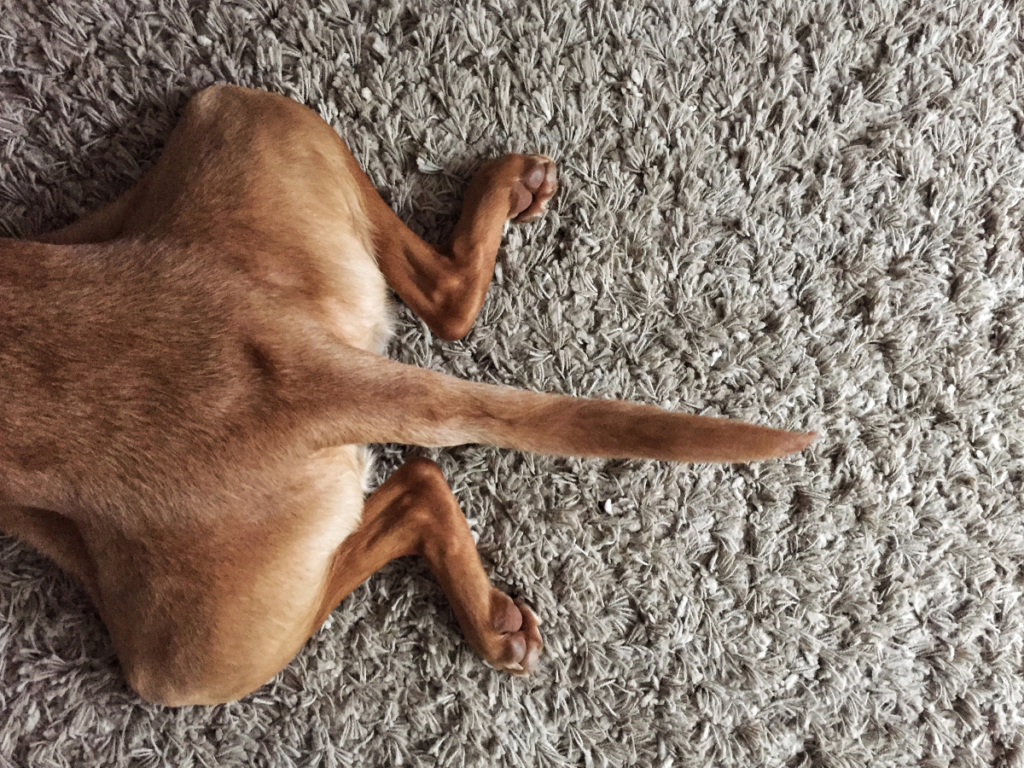
The 7 Ways to Help a Dog Express Their Anal Glands
1. Give Your Dog Additional Dietary Fiber
the fiber content in your dog’s diet can be beneficial in preventing anal gland swelling. You have several options for achieving this, such as switching to a high-fiber dog food recipe or incorporating fiber-rich foods into their meals.
Consider adding raw vegetables like pumpkin to your dog’s diet, as they are rich in fiber and can help regulate bowel movements. Additionally, you can include powdered fiber supplements or offer specially formulated dog treats that contain fiber.
Flaxseed and psyllium husk are excellent sources of fiber that you can add to your dog’s meals. However, it’s important to measure the amount carefully to avoid overfeeding, which could lead to digestive issues such as diarrhea. Finding the right balance of fiber in your dog’s diet can help promote healthy digestion and prevent anal gland problems.
2. Increase Overall Moisture Content
that your dog stays adequately hydrated is crucial for their overall health, including the prevention of anal gland issues. There are various strategies you can use to encourage your pup to drink more water or consume moisture-rich foods.
Investing in a flowing water fountain can make drinking water more enticing for your dog, as the movement may pique their interest. Another option is to allow your dog access to running water from the bathtub or sink, which some dogs may find more appealing than still water in a bowl.
In addition to these water-focused approaches, you can incorporate snacks and foods with high moisture content into your dog’s diet. Consider offering doggy-specific popsicles, broth, ice cubes made from diluted broth or water, and fresh or canned dog foods as meal toppers. These options not only provide hydration but also add variety to your dog’s diet and may encourage them to consume more fluids throughout the day.
3. Create a Weight Loss Plan
your dog maintains a healthy weight is essential for preventing various health issues, including anal gland problems. By managing your dog’s meal portions and discussing dietary needs with your veterinarian, you can help your furry friend shed excess pounds while promoting overall well-being how to help dog express glands naturally.
4. Prebiotics and Probiotics
Incorporating prebiotic or probiotic supplements into your dog’s diet can support a healthy digestive system, potentially benefiting their anal gland health and overall gastrointestinal function. However, it’s essential to consult with your veterinarian before introducing any supplements to ensure they are suitable for your dog and won’t cause adverse reactions. Your vet can provide guidance on the appropriate dosage and specific supplements that align with your dog’s needs and health status.
5. Apply a Warm Compress
If you suspect that your dog’s anal glands are impacted, applying a warm compress may help encourage them to drain naturally and relieve some of the associated discomfort. However, if your dog finds this maneuver too painful or intolerable, it’s crucial to seek veterinary care promptly. A veterinarian can assess the situation and provide appropriate treatment to address the impacted anal glands effectively.
6. Increase Exercise
Boosting your dog’s physical activity levels can sometimes help reduce the likelihood of anal gland impaction. Regular exercise promotes optimal bodily functions, encouraging everything to flow smoothly. If your dog’s activity levels have decreased, it’s beneficial to encourage them to move more frequently. This might involve increasing the frequency of walks, visiting the dog park, embarking on hiking excursions, or engaging in backyard play sessions.

7. Consider Switching Diets
If your dog’s anal gland issues persist, your veterinarian might suggest a dietary adjustment. This could involve transitioning to a prescribed diet featuring dry kibble. Alternatively, they might recommend a more natural approach, such as a raw diet, homemade meals, or a selection of fresh foods.
These dietary changes not only increase moisture content but also provide more nutrients compared to typical commercial dog foods. This is because they often lack the preservatives and fillers found in many commercial products. Ultimately, the best option for addressing the issue depends on your preferences, your dog’s needs, and your budget, all of which can be discussed with your veterinarian.
